Tribal Nations are sovereign governments with inherent authority over their lands and citizens. This is a political status that predates the establishment of the United States and continues to be recognized by the United States. Historically, the federal government has used terms like “Tribes,” to refer to Tribal Nations and “Tribal member” to describe Tribal citizenship. Similarly, the United States has used terms like “Indian” or “American Indian” to refer to Tribal citizens. These terms continue to be used in different settings, especially because they are ingrained in the body of law known as Federal Indian Law.
The terms “Tribal Nation” and “Tribal citizen” are preferable when the context allows, as these terms more accurately reflect Tribal sovereignty. For instance, the phrase “Tribal member” could be interpreted as membership in a non-governmental organization. Unlike citizenship, membership in an organization may be purchased or gained after associating in private relationships. By contrast, citizenship is a political status with criteria determined by law, resulting in legal rights and responsibilities as determined by the sovereign to which the citizen belongs.
In 1924, the United States unilaterally conferred United States citizenship on citizens of Tribal Nations. Since then, every Tribal citizen born within the boundaries of the United States is a United States citizen. While the federal government’s action in 1924 was an encroachment on Tribal sovereignty and self-determination in the eyes of some, Tribal citizens now have and exercise the civil rights of all United States citizens. Still, more than 100 years later, Tribal citizens’ civil rights are constantly violated. For instance, Tribal citizens are disproportionately disenfranchised due to a host of obstacles to voting in local, state, and federal elections.
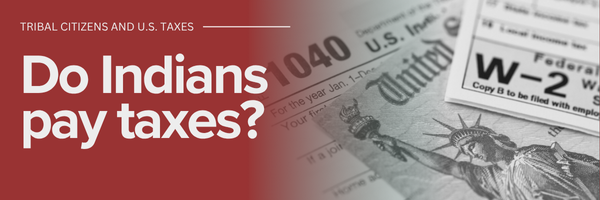
Tribal Sovereignty, Tribal Nations’ Government-to-Government Relationships with the United States, and Treaties
Reflective of their sovereign status predating the United States, Tribal Nations have government-to-government relationships with the federal government. These relationships bear significant similarities to those which the United States shares with nations around the world. These relationships are evidenced by the numerous treaties that Tribal Nations have entered into with the United States. Under many of these treaties, the United States accepted important legal obligations to Tribal Nations. The United States Constitution affirms that treaty obligations are the supreme law of the land. The legitimacy of treaties with Tribal Nations has also been affirmed in numerous acts of Congress, Executive Branch actions, and judicial precedents.
Tribal Nations’ government-to-government relationships with the United States are important, as they require the federal government to engage in consultation and collaboration with Tribal Nations to ensure Tribal sovereignty is respected and the United States is held accountable to fulfill its treaty obligations and trust responsibility to Tribal Nations. The trust responsibility is a unique aspect of government-to-government relationships between Tribal Nations and the United States, as explained in the next section.
The Trust Responsibility to Tribal Nations
Unlike the United States’ relationship to other nations, the United States has a “trust responsibility” to Tribal Nations. Through a complex series of historical relations and events with Tribal Nations, especially treatymaking, the United States has charged itself with this trust responsibility. Through treaties, Tribal Nations prepaid for trust obligations with their lands and resources. The United States Supreme Court has described this as “moral obligations of the highest responsibility and trust.” Seminole Nation v. United States, 316 U.S. 286, 297 (1942). The U.S. Bureau of Indian Affairs describes the trust responsibility to Tribal Nations as “a legally enforceable fiduciary obligation on the part of the United States to protect Tribal treaty rights, lands, assets, and resources, as well as a duty to carry out the mandates of federal law with respect to American Indian and Alaska Native tribes and villages.”
Importantly, NARF filed the Isleta v. Burgum lawsuit in 2025 after the United States, without consulting Tribal Nations, withheld education funding, in gross violation of statutes and regulations enacted as part of its trust responsibility.
Additionally, in its government-to-government dealings with Tribal Nations, the United States has taken on legal trust obligations specific to different Tribal Nations. In some Tribal treaties, the United States agreed—in exchange for Tribal Nations’ lands and promises of peace—to be bound by a host of obligations, including, for example: guarantees that Tribal Nations would enjoy exclusive use, occupancy, and governance in territories they retained (typically referred to as “reservations”); the protection of the United States within those territories from criminal outsiders; healthcare and education; and continued access to traditional hunting and fishing grounds. Notably, while these treaty obligations have great on-going significance, they were often negotiated on an unequal playing field, with the United States deploying coercive and fraudulent tactics to achieve its ends of obtaining Indian lands for the least amount of compensation possible. Recognizing this, as well as other facts evidencing fundamental unfairness to Tribal Nations in treatymaking, courts take a liberal approach when interpreting treaties, drawing all inferences and resolving any ambiguities in the text in favor of Tribal Nations. This approach is consistent with the firmly established law that treaty obligations are a critical part of the federal trust responsibility to Tribal Nations.
The United States’ trust responsibility is also defined by other federal laws, such as acts of Congress and judicial precedent. For example, the Native American Graves Protection and Repatriation Act, which requires federal agencies to repatriate and protect Native American human remains and other cultural items, reflects the trust responsibility. 25 U.S.C. § 3010. As another example, the American Indian Religious Freedom Act states that the policy of the United States is to protect and preserve American Indian religions. 42 U.S.C. § 1996.
The trust responsibility, being a moral as well as legal obligation, requires the United States to act in the best interests of Tribal Nations. While the United States negotiated for some lands and claims to authority through treaties with Tribal Nations, much of its current land base was illegally obtained by conquest, coercion, unequal bargaining power, and laws it unilaterally imposed on Tribal Nations. United States laws are currently inconsistent with International Law in that they do not fully recognize the sovereignty or land claims of Tribal Nations. The United States does, however, still have obligations, as part of its trust responsibility, to manage lands and resources and to act in all situations in the best interests of Tribal Nations.
Tribal Citizenship Is Not a Racial Status, and the Trust Responsibility and Treaty Obligations Are Not Based on Race
Tribal citizenship is not a matter of race, rather, it is a political classification defined by Tribal Nations’ laws. Who may hold citizenship in any nation, including Tribal Nations, depends on criteria determined by that nation’s laws. Though Tribal Nations’ citizenship criteria may include consideration of lineage within the Tribal Nation, this does not make Tribal citizenship a racial status. Similarly, having lineage in a Tribal Nation does not automatically mean someone is a Tribal citizen, as they must meet any other criteria the Tribal Nation requires for citizenship (e.g. residency).
Likewise, the trust responsibility and treaty obligations to Tribal Nations and citizens are not based on race. “While the United States Constitution has an Equal Protection clause to ensure equal application of the law no matter an American citizen’s race, Tribal citizenship is a political status and treaty obligations have nothing to do with race,” said Native American Rights Fund Deputy Director Matthew L. Campbell. “Misunderstanding the difference between the political status of citizenship and a designation of concepts like race has limited people’s understanding of Tribal-U.S. relations for centuries.”
Tribal Nations Govern Within a Complex Arena of Legal Authority and Jurisdiction
Tribal, federal, state, and local governments all operate within the bounds of their legal authority and jurisdiction. The reach of these respective governmental bodies’ authority and jurisdiction is determined by a complex order that may be hierarchical or overlapping and which is frequently disputed. Legal authority and jurisdiction are critical, as they determine the persons and matters over which a government has authority to make laws. They also determine which court systems or other kinds of forums are available and appropriate to resolve legal disputes.
Questions about whose law applies and who has jurisdiction are fundamental considerations for all sovereigns. In the United States, these questions are uniquely important for Tribal Nations because Tribal Nations often have laws and dispute resolution methods that are significantly different from Western legal systems. For example, unlike the often-punitive nature of Western law, many Tribal Nations use dispute resolution methods like peacemaking that focus on restoring harmony rather than simply punishing offenders. While legal authority and jurisdiction can sometimes be determined by geographical boundaries or citizenship status of individuals involved, Tribal treaties, federal statutes, state-Tribal compacts, and other legal instruments and agreements negotiated with Tribal Nations may also bear on what law applies.
While legal authority and jurisdiction are complex and constantly litigated, Tribal Nations are increasingly asserting the full extent of their inherent sovereignty. By doing so, Tribal Nations can self-govern without external interference. This better situates Tribal Nations to develop their economies, care for the health and well-being of their citizens, and live in accordance with their traditions and cultural values. Accordingly, Tribal Nations are continually calling on the federal government to fulfill its trust responsibility to respect and defend Tribal sovereignty by supporting and defending Tribal jurisdiction. As jurisdictional conflicts arise, federal, state, and local governments must ensure all governing entities respect Tribal sovereignty.
There Are 574 Federally Recognized Tribal Nations
As of 2025, the federal government “recognizes” 574 Tribal Nations within the United States. At one point in history, the United States ceased to recognize many Tribal Nations by terminating their federal recognition. Federal recognition is important as it cements the formal government-to-government relationship between a Tribal Nation and the federal government. This affirms certain sovereign rights of Tribal Nations as well as federal obligations pursuant to the United States’ trust responsibility. Because of this, many Tribal Nations have sought to establish or restore their federal recognition.
Each Tribal Nation has its own laws and governmental structure. Some federally recognized Tribal Nations are confederacies of several Tribal Nations. Thus, a Tribal Nation may be composed of several cultures, languages, or ethnic groups.
Alaska is home to 229 of the 574 federally recognized Tribes, each with their own governments. Alaska’s Tribal Nations are not legally connected to Alaska Native Corporations (ANCs). ANCs were established pursuant to the Alaska Native Claims Settlement Act of 1971 (ANCSA), are for-profit corporations incorporated under Alaska State law, and are not sovereign governments. ANCSA does not undermine or otherwise negate the existence of Alaska’s Tribes, which enjoy the same inherent sovereignty and rights that other Tribal Nations do.
The United States does not currently recognize a government for the Kingdom of Hawaiʻi. As such, federal law sometimes addresses Native Hawaiians in their social or cultural organizational capacities as “Native Hawaiian Organizations.” The State of Hawaiʻi also includes an independent “fourth branch of government,” called the Office of Hawaiian Affairs, whose elected trustees safeguard Native Hawaiians’ unique education, health, housing, and land interests.
Tribal Nations’ Engagement at the United Nations
On the global level, for more than a century, Tribal Nations and other Indigenous Peoples have advocated for inclusion and self-representation in the United Nations (UN) and its predecessor, the League of Nations. Although Indigenous Peoples for decades have participated in meetings of various UN bodies, they have not been able to participate under their own government credentials except in those mechanisms specifically addressing Indigenous issues like the UN Permanent Forum on Indigenous Issues and the UN Expert Mechanism on the Rights of Indigenous Peoples. Efforts to address this and “enhance” Indigenous Peoples’ participation at the UN are ongoing. In a step in the right direction, in 2024, Indigenous Peoples for the first time spoke at the UN Human Rights Council in their own right as self-determining Peoples.
Recognition of the rights of Indigenous Peoples at the global level is growing and is impacting developments at the national level. In 2007, following decades of advocacy by Indigenous Peoples around the world, the UN General Assembly adopted the Declaration on the Rights of Indigenous Peoples. The Declaration sets forth globally accepted minimum standards for recognition and protection of Indigenous Peoples rights, and is supported by all 193 UN Member States, including the United States. Various federal Indian policy measures, including regulations and guidance, expressly cite the Declaration, and several examples embrace the Declaration’s principle of “free, prior, and informed consent” as a safeguard for ensuring the rights of Tribal Nations. The Implementation Project (a joint project of NARF and CU Law) focuses on achieving the aims of the UN Declaration on the Rights of Indigenous Peoples
Tribal Nations and Citizens: Know Your Rights
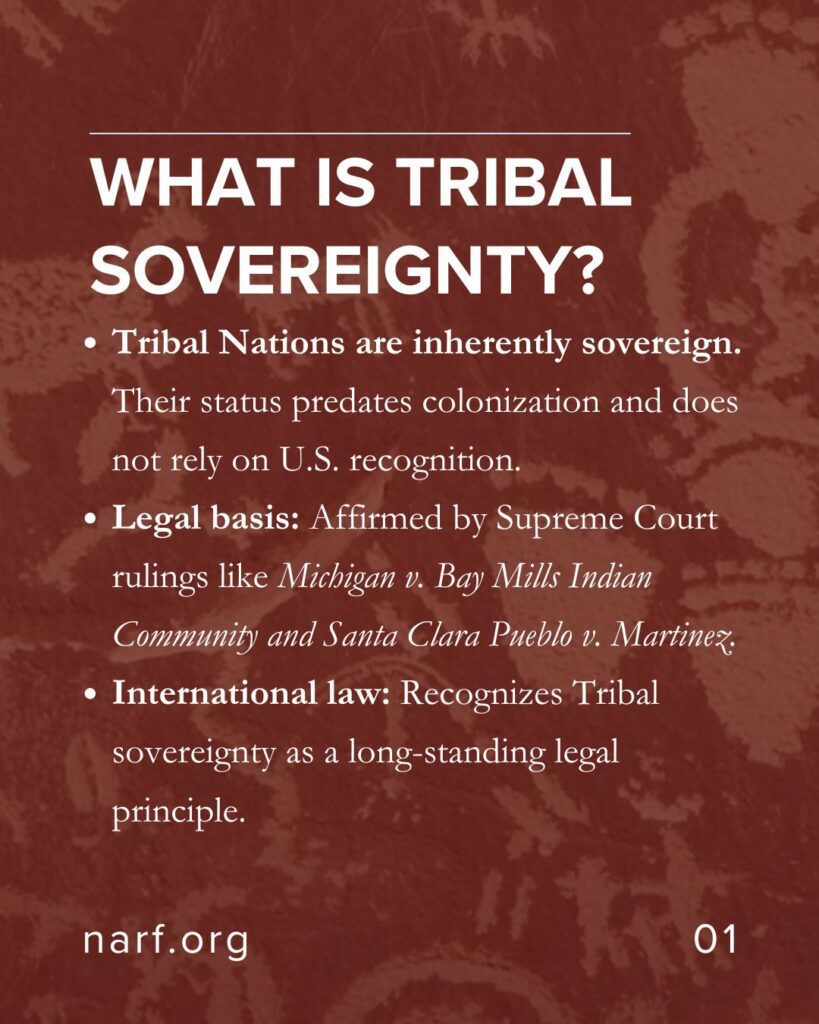
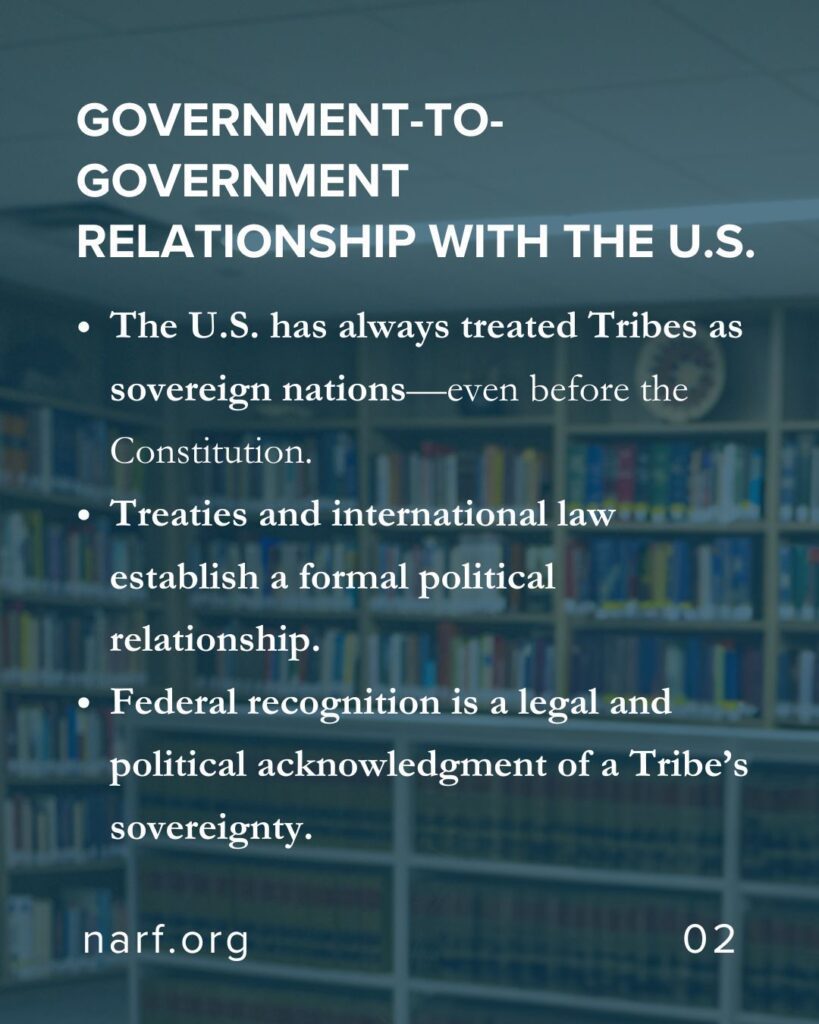
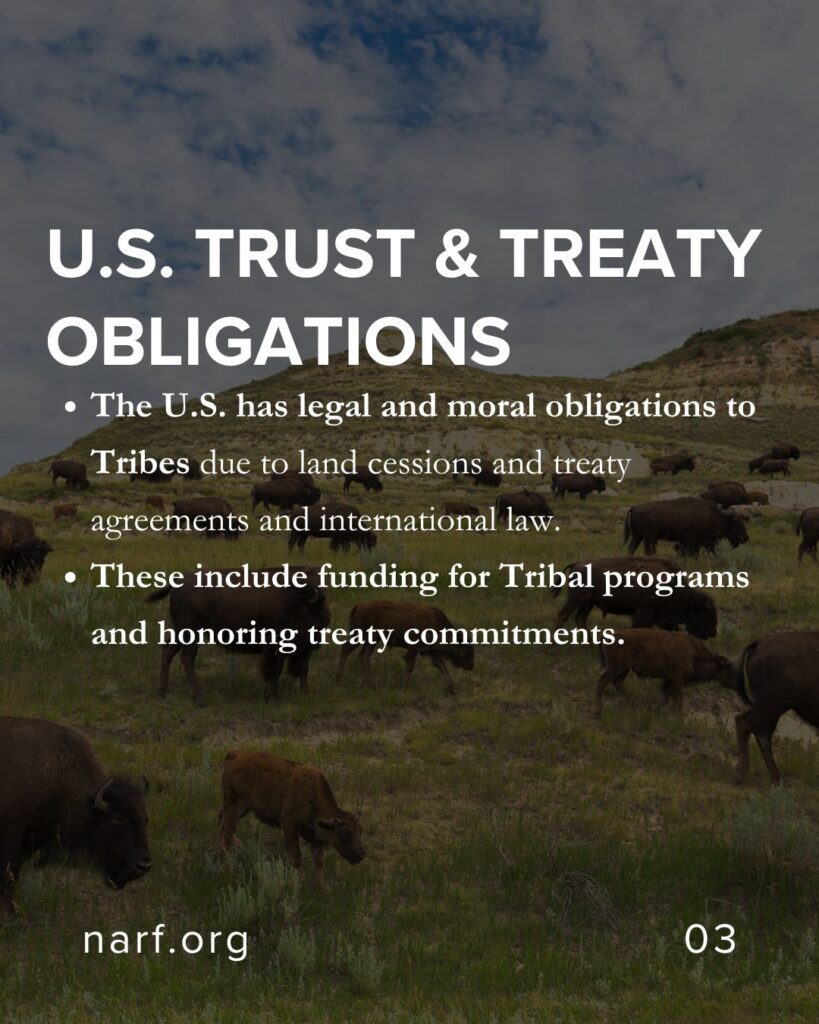
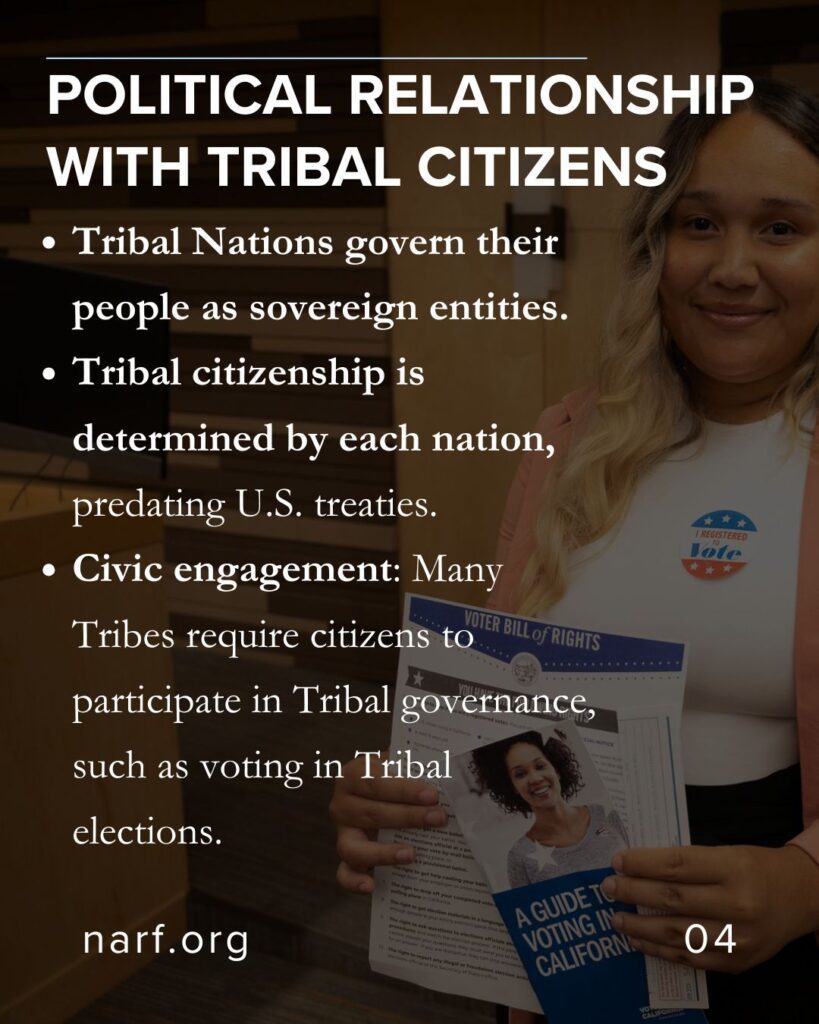
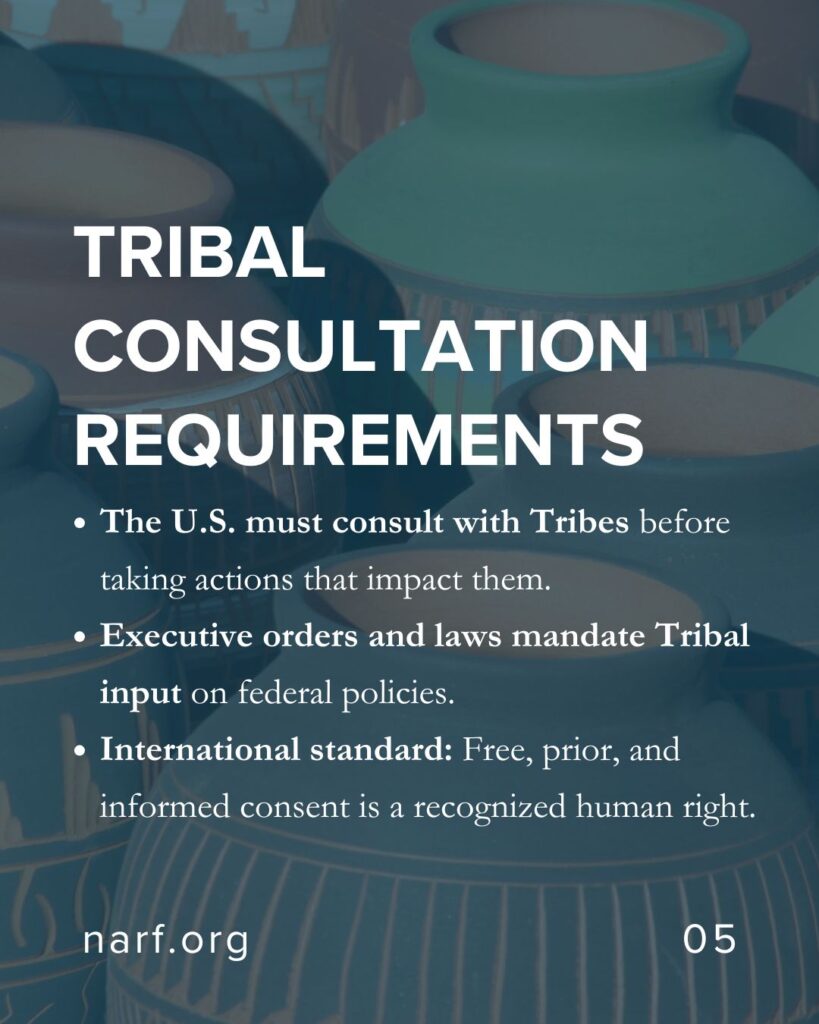
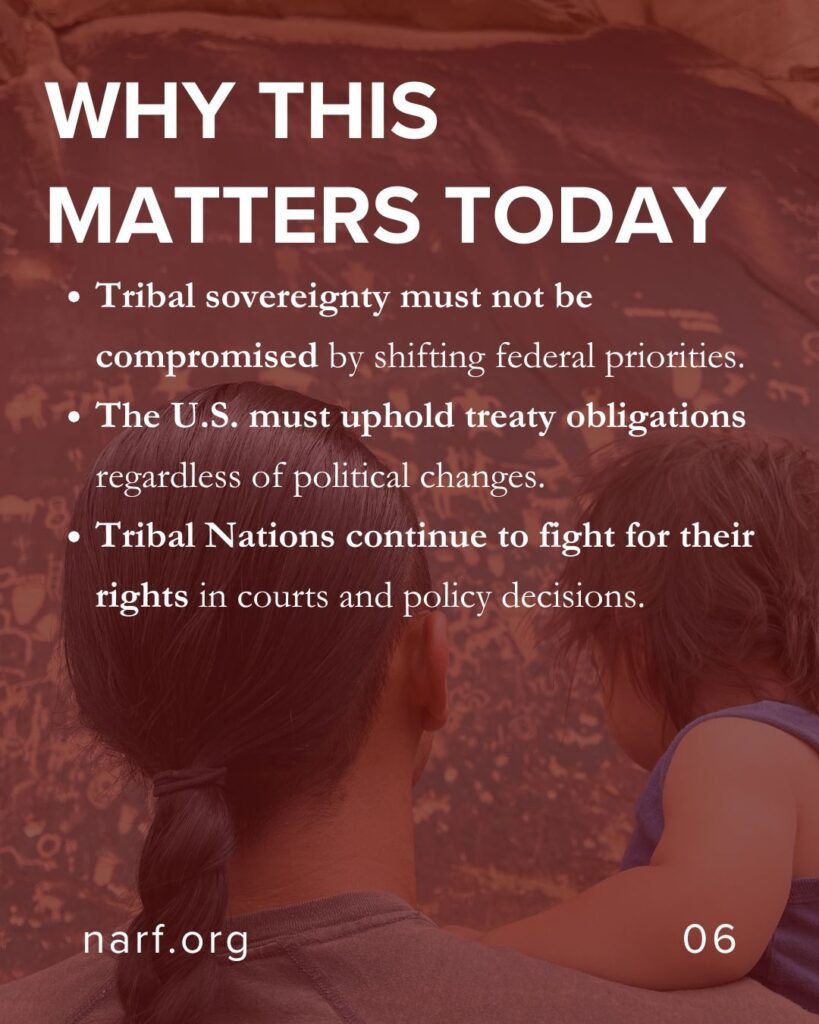
The United States’ obligation to fulfill treaty obligations and act as a responsible trustee for Tribal Nations and citizens are grounded in the United States Constitution, treaties, statutes, executive orders, and other sources of federal law. Although Tribal Nations and their citizens have a host of robust rights under these laws, such rights are often ignored or violated. NARF exists to address such injustice by raising awareness and vindicating the rights of Tribal Nations and their citizens. To learn more about Tribal rights, visit:
- Native American Rights Fund
- National Indian Law Library
- NARF Indian Child Welfare Act
- Protecting Native Voting Rights
- NARF Peacemaking Project
- The Implementation Project
NARF provides legal assistance to Tribal Nations, Native organizations, and Native individuals nationwide who might otherwise have gone without adequate representation. NARF’s work depends upon the dedication of its employees and support from individuals and organizations alike. If you would like to help NARF increase its capacity to strengthen and defend Tribal sovereignty and to hold the United States accountable to fulfill its obligations to Tribal Nations and citizens, please donate today.
More blog posts

